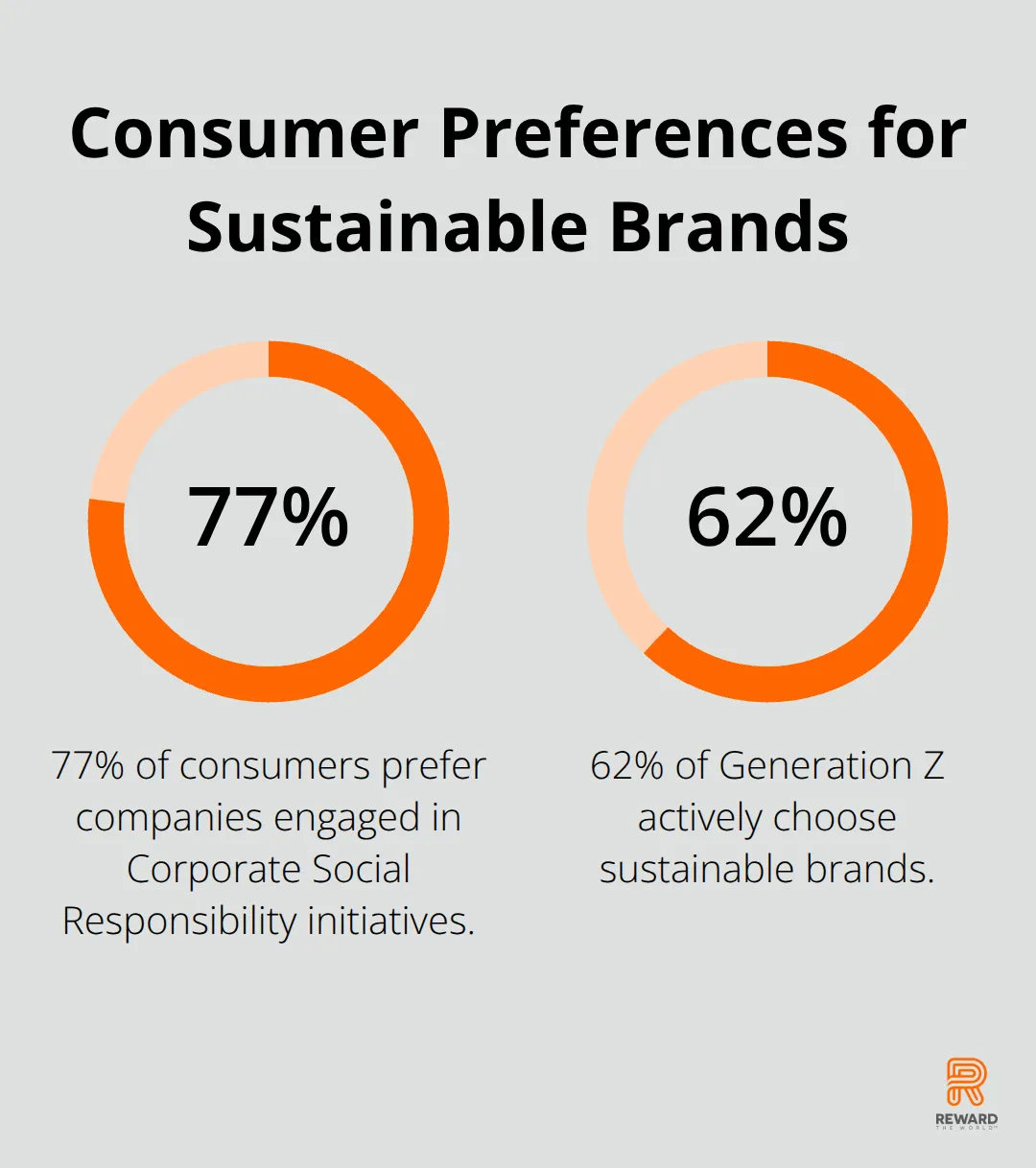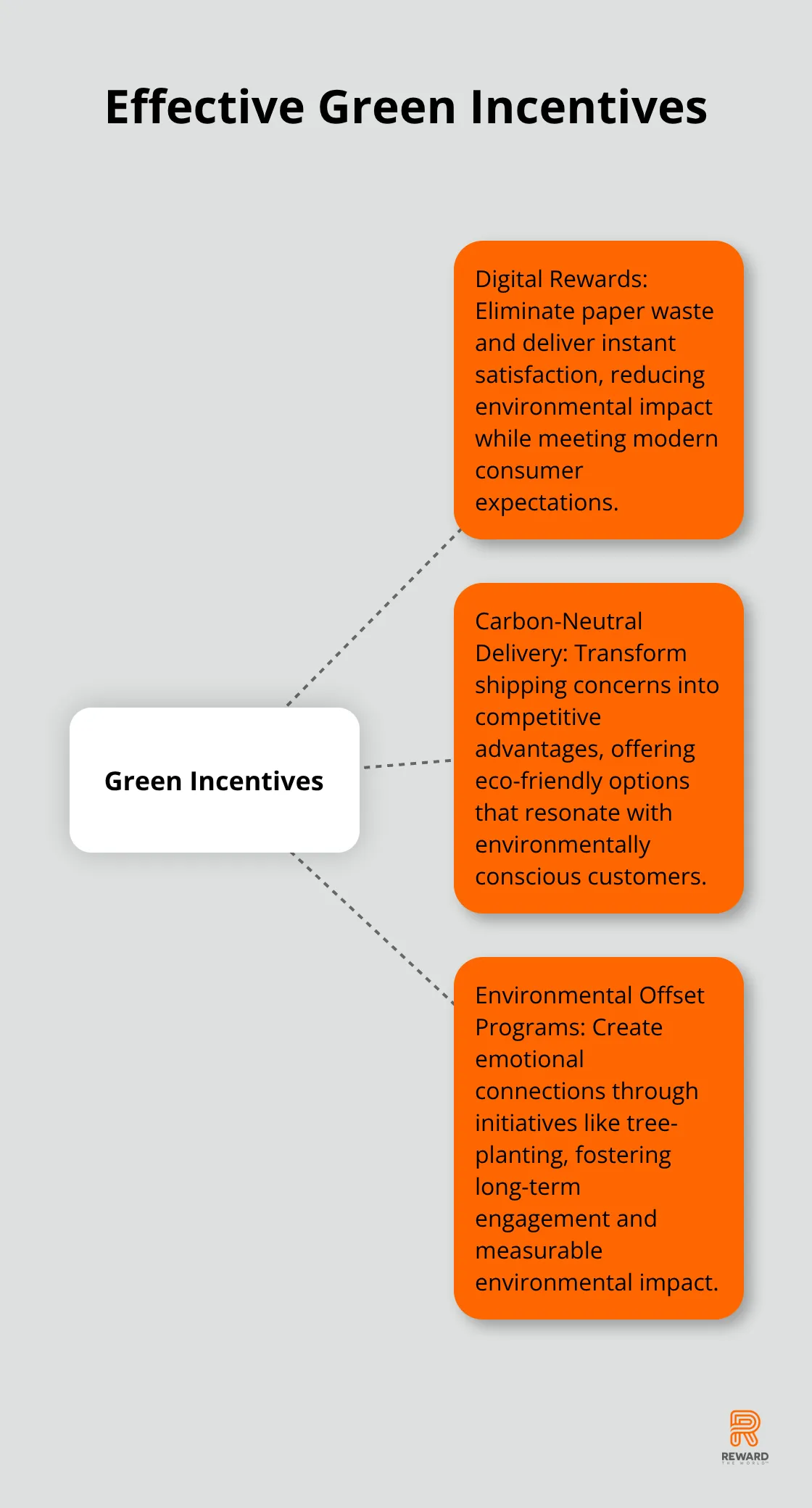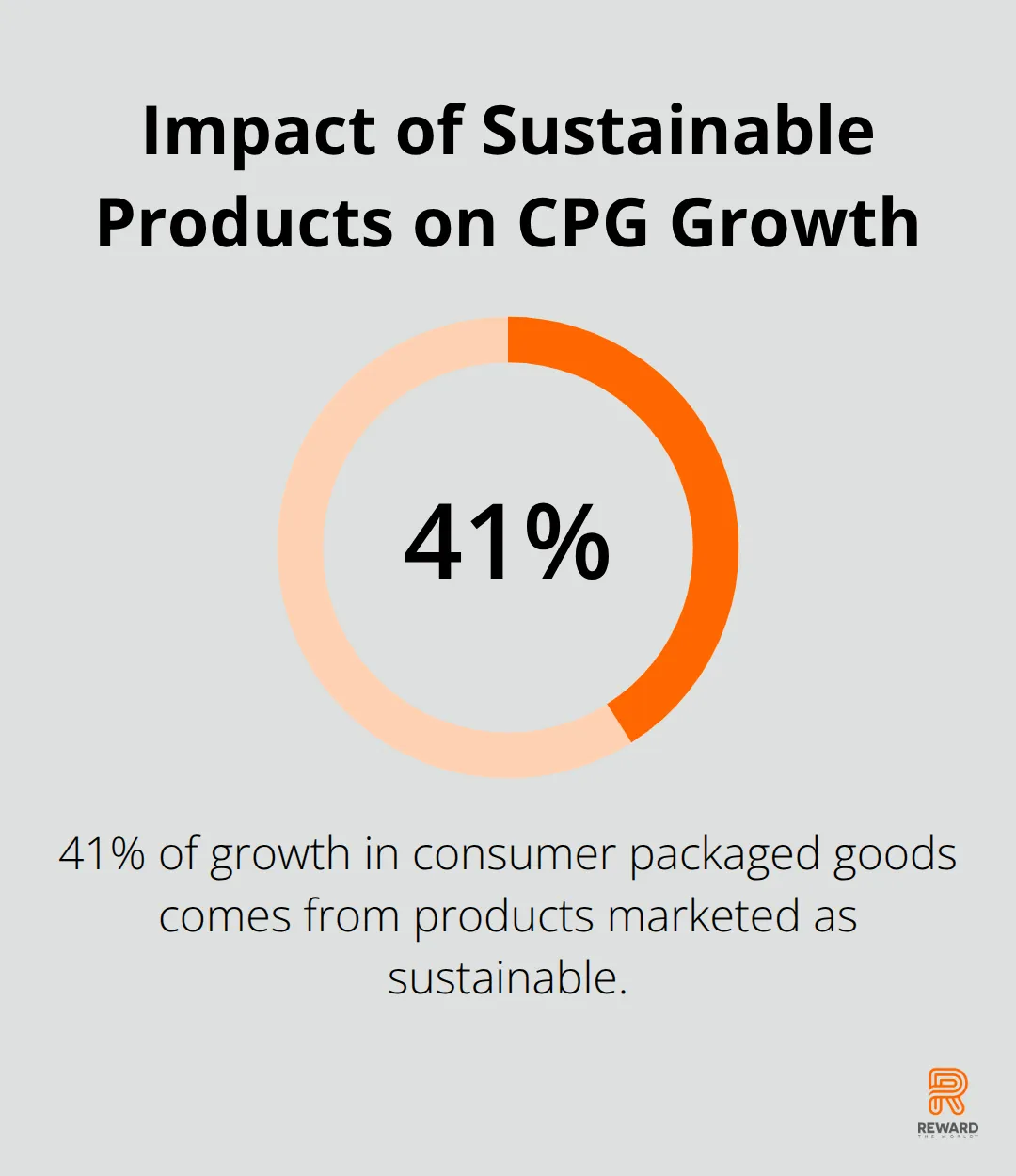
Environmental responsibility has become a business imperative. Companies that ignore sustainability risk losing customers to competitors who prioritize green practices.
We at Reward the World see how green loyalty programs transform customer relationships. Eco-friendly incentives don’t just reduce environmental impact-they build stronger brand connections and drive measurable retention gains.
Why Consumer Eco-Expectations Are Reshaping Business
Consumer behavior has shifted dramatically toward sustainability, which forces businesses to adapt or lose market share. A 2025 global survey found that 77% of consumers prefer to purchase from companies that engage in Corporate Social Responsibility initiatives, while Generation Z leads this charge with 62% who actively choose sustainable brands (according to First Insight). This represents a fundamental change in how consumers evaluate brands and make purchase decisions.

The Economics of Green Consumer Preferences
The financial impact of eco-conscious consumer behavior proves substantial. Research shows that 78% of consumers value a sustainable lifestyle, with 30% more likely to purchase sustainable products. More importantly, consumers back their preferences with real money-a 2024 PwC survey revealed that shoppers would pay an average of 9.7% more for sustainably sourced goods. This premium tolerance creates immediate revenue opportunities for companies that implement genuine environmental initiatives. Unilever’s data proves this point: their sustainable brands grew 69% faster than the rest of their business, which demonstrates clear competitive advantages for eco-focused strategies.
Generational Divide Drives Market Transformation
The generational gap in environmental expectations creates distinct market segments that require different approaches. Generation Z and Millennials don’t just prefer sustainable brands-they abandon companies that fail environmental standards. One in three consumers have stopped purchases from brands over ethical or sustainability concerns (according to Deloitte research). This behavior pattern means businesses face immediate revenue loss when they ignore environmental responsibilities. Digital natives view sustainability as a baseline expectation, not an added benefit, which fundamentally changes how loyalty programs need to operate.
The Competitive Advantage of Early Adoption
Companies that embrace sustainable practices early gain significant market advantages over slower competitors. Sustainable brands achieve higher revenue growth, with an average of 11% per year even during challenging economic times. Businesses with high environmental, social, and governance ratings often enjoy lower costs of debt and equity according to Deloitte. These financial benefits extend beyond customer acquisition to operational efficiency and investor relations. Smart businesses recognize that eco-friendly incentives create multiple value streams that traditional reward programs simply cannot match.
What Green Incentives Actually Work
Digital Rewards Transform Environmental Impact
Digital-first reward strategies eliminate paper waste while they deliver instant satisfaction that modern consumers expect. Paperless gift cards reduce environmental impact compared to physical alternatives, though specific reduction percentages vary by implementation and measurement methodology. These digital rewards cost less to distribute than traditional printed materials, which creates budget space for more substantial environmental initiatives. Smart companies pair digital delivery with sustainability messages that reinforce their environmental commitment at every touchpoint. Costa Coffee’s loyalty program demonstrates this approach when it rewards customers with extra points for reusable cups, which resulted in increased reusable cup adoption within six months of launch.
Carbon-Neutral Delivery Changes Customer Perception
Shipping represents the largest environmental concern for online retailers, but carbon-neutral delivery options transform this weakness into a competitive advantage. Companies that offer green shipping see higher customer satisfaction scores compared to standard delivery options, though sustainability considerations face challenges in the current volatile logistics environment. Patagonia’s carbon-neutral shipping program costs more than standard delivery but generates higher customer lifetime value from environmentally conscious segments. The key lies in transparent communication about environmental impact – customers need specific data about carbon savings, not vague sustainability promises.

Environmental Offset Programs Drive Long-Term Engagement
Tree-planting initiatives and environmental offset rewards create emotional connections that traditional discounts cannot match. Koh’s cleaning products program plants one tree per order, which has saved plastic bottles from landfills while it builds remarkable customer loyalty. Timberland’s sustainability platform provides real-time data on environmental impact, which fosters consumer trust through complete transparency. These programs work because they give customers agency in environmental protection while they create measurable impact that brands can promote. The most successful offset programs tie rewards directly to purchase behavior and provide customers with specific impact metrics that validate their environmental contributions.
The effectiveness of these green incentives becomes clear when companies track their impact on customer behavior and brand perception.
How Green Incentives Change Customer Behavior
Retention Rates Show Measurable Improvements
Sustainable reward programs deliver retention gains that traditional programs cannot match. H&M’s garment collection program offers vouchers for textile recycling and generated significant media coverage while it enhanced brand image and consumer education. Companies that implement green incentives see customer retention correlate with a 25% increase in profit, according to industry data from multiple retailers.
REI’s membership program allows customers to support environmental causes through purchases, which creates emotional connections that extend far beyond transactions. The most successful programs track specific metrics like repeat purchase rates, customer lifetime value increases, and environmental impact per customer to demonstrate clear business outcomes.
Brand Perception Transforms Through Environmental Action
Environmental initiatives change how customers view brands and generate substantial competitive advantages over companies that ignore sustainability. Starbucks’ reusable cup initiative rewards customers with discounts for their own cups, reduced disposable waste, and improved brand perception scores by double digits according to customer surveys.
Patagonia’s Worn Wear program allows customers to trade used gear for store credit, promotes a circular economy, and reinforces the brand’s environmental commitment. These programs work because they align customer actions with brand values and create authentic relationships that resist competitor attempts to steal market share. Companies that implement genuine environmental initiatives report 30% increase in consumer loyalty among target demographics.
Eco-Conscious Segments Drive Higher Revenue
Eco-conscious customer segments generate higher revenue per customer than traditional segments, which makes green incentives profitable investments rather than cost centers. Sephora’s Beauty Insider program permits points redemption for donations to environmental charities and attracts customers who spend 30% more than average program members.
The 2024 Edelman Trust Barometer emphasizes that sustainability builds consumer trust, which translates directly to increased purchase frequency and higher order values. Products marketed as sustainable are responsible for 41% of growth in consumer packaged goods, which proves that environmental positioning drives real market share gains.

Long-Term Value Creation Through Green Programs
Environmental reward programs create sustained customer engagement that extends beyond immediate transactions. Costa Coffee’s loyalty scheme rewards customers with extra points for reusable cups and promotes sustainable behavior while it builds brand loyalty. A 2025 Deloitte survey found that sustainable practices boost employee satisfaction and attract top talent, which creates internal momentum for environmental initiatives.
Companies that integrate sustainability into their operations experience stronger consumer engagement and brand loyalty across all customer touchpoints. The most effective programs combine immediate rewards with long-term environmental impact, which satisfies customer expectations while it builds competitive differentiation.
Final Thoughts
Eco-friendly incentives represent a fundamental shift in how businesses build customer relationships. The data shows clear results: companies that implement green loyalty programs see measurable improvements in retention rates, brand perception, and revenue growth from environmentally conscious segments. These programs create competitive advantages that traditional rewards cannot match.
The long-term value extends beyond immediate customer satisfaction. Sustainable practices build trust, attract top talent, and position brands for future market demands (while traditional approaches fail to address evolving consumer expectations). Companies that embrace environmental responsibility now gain first-mover advantages in an increasingly eco-conscious marketplace.
Implementation requires strategic planning and authentic commitment. We at Reward the World offer comprehensive solutions that support sustainable reward initiatives, which help companies transform their customer engagement while they reduce environmental impact. The choice is clear: businesses that integrate sustainability into their reward strategies will thrive, while those that ignore environmental expectations will lose market share to more forward-thinking competitors.
